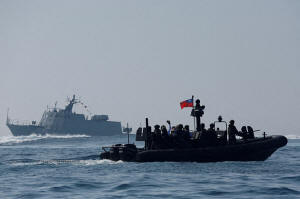U.S. and Taiwan navies quietly held Pacific drills in April, sources say
 Send a link to a friend
Send a link to a friend
 [May 14, 2024]
TAIPEI (Reuters) - The U.S. and Taiwan navies conducted
joint drills in the Pacific in April that, officially, did not take
place, four people briefed on the matter said, as the two militaries
boost cooperation amid rising Chinese military threats. [May 14, 2024]
TAIPEI (Reuters) - The U.S. and Taiwan navies conducted
joint drills in the Pacific in April that, officially, did not take
place, four people briefed on the matter said, as the two militaries
boost cooperation amid rising Chinese military threats.
Washington and Taipei have been expanding their military cooperation in
recent years amid almost daily Chinese incursions into Taiwan's air
defense identification zone and drills by Chinese forces near the
island.
U.S.-Taiwan military engagement, including visits and training, are kept
low-key and are often not officially confirmed because of China's
objection to any military contacts between Washington and Taipei. China
claims democratically governed Taiwan as its own territory, which the
island strongly rejects.
The drills, which were not publicized, took place last month in the
Western Pacific, according to the sources, who requested anonymity given
the sensitivity of the matter.
One source said "multiple military assets" were involved. A second
source said the drills did not officially exist and were dubbed
"unplanned sea encounters", pointing to a tacit agreement in which both
sides claim the exercises were simply the result of coincidental
encounters.
"It's like I am dining in this restaurant and you also happen to be
here," the source said. "Then it looks like I am only sharing the same
table with someone."
That source also said about half a dozen navy ships from both sides,
including frigates and supply and support vessels, participated in the
days-long exercises, which were designed to practice "basic" operations
such as communications, refueling and resupply.

Taiwan's navy said in a statement to Reuters that to handle unexpected
scenarios at sea and to minimize "interference" with each another, the
navy "acts in concert with the U.S.-promoted Code for Unplanned
Encounters at Sea", also known as CUES.
"The Navy often makes contact with vessels of other countries and
conducts encounter drills as needed," the statement said, without
elaborating.
The Pentagon declined to comment.
Taiwan and the United States have no official diplomatic relationship,
as Washington formally recognizes Beijing but is bound by law to provide
Taiwan with the means to defend itself and is the island's most
important international backer.

[to top of second column]
|

Members of Taiwan's Navy and media onboard a special operation boat
navigate near a Kuang Hua VI-class missile boat, during a drill part
of a demonstration for the media, to show combat readiness ahead of
the Lunar New Year holidays, on the waters near a military base in
Kaohsiung, Taiwan January 31, 2024. REUTERS/Carlos Garcia
Rawlins/File Photo

A third source said although the "unplanned encounters" of the two
navies involved mostly basic exercises, such drills are vital to
ensure the two militaries can operate together in times of
emergency.
The source added that the two navies also practiced various tactical
maneuvers, including searching for underwater targets.
CUES was formulated about a decade ago to help de-escalate tensions
between militaries at sea, providing guidelines such as safe speeds
and distances, a common communications language, and what actions to
take if a ship becomes disabled.
China's foreign ministry repeated its opposition to military ties
between the U.S. and Taiwan, urging the U.S. to stop its "erroneous
acts" of military collusion with Taiwan, and warning Taiwan
authorities that seeking independence by force and resisting
"reunification" would fail.
China's defense ministry did not immediately respond to a request
for comment.
Taiwan's navy chief, Tang Hua, last month visited the United States
and discussed how to boost bilateral naval cooperation, Reuters
reported. In response, China's foreign ministry said it firmly
opposed "military collusion" between the United States and Taiwan.
This month, Taiwan's Chief of the General Staff Admiral Mei Chia-shu
attended the change-of-command ceremony for U.S. Indo-Pacific
Command in Hawaii, which only came to light after he was spotted in
the audience in an official picture.
China has long said Taiwan is China's most sensitive territorial
issue, which is a major bone of contention in Sino-U.S. ties.
Beijing has not renounced the use of force to bring Taiwan under its
control, while Taipei says the Chinese territorial claims are void
as the People's Republic of China has never governed the island.
(Reporting by Reuters; Editing by Gerry Doyle and Subhranshu Sahu)
[© 2024 Thomson Reuters. All rights reserved.]This material
may not be published, broadcast, rewritten or redistributed.
Thompson Reuters is solely responsible for this content. |